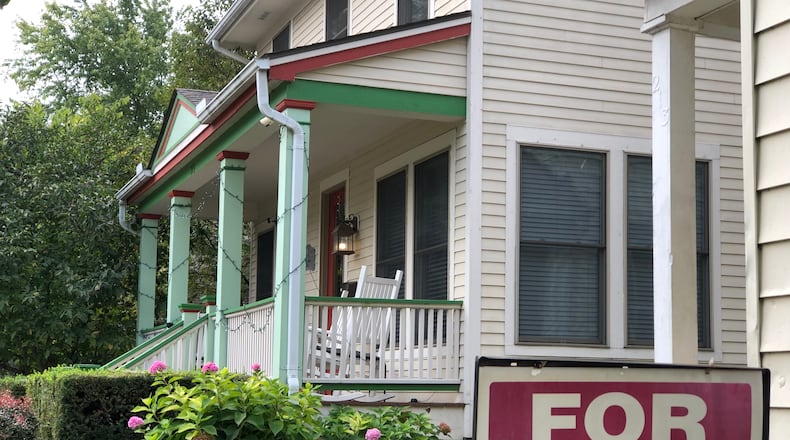Montgomery County residents who are financially struggling because of the coronavirus crisis also have a good shot at getting rental assistance, which is desperately needed since rent eventually will come due and many will be unable to pay without help, advocates say.
Miami Valley Community Action Partnership has millions of dollars available to help people in the county avoid being booted by their landlords and losing their housing.
“The Montgomery County commissioners had the extraordinary foresight to provide this large amount of resources, which is more than anybody in the state,” said Lisa Stempler, president and CEO of Miami Valley CAP. “We have more money than Cincinnati, than Columbus, to provide rent assistance.”
The Centers for Disease Control and Prevention this month issued an unprecedented nationwide order banning landlords from evicting tenants who meet certain criteria.
The CDC’s order requires that tenants fill out and send in a declaration form to their landlords, under penalty of perjury, that says they qualify for eviction protection. The forms are available online including on the CDC’s website, as well as at MiamiValleyCAP.org and www.Ohiolegalhelp.org.
Who qualifies
Renters must declare they cannot afford to pay rent because they were laid off, incurred large medical expenses or lost a substantial portion of their incomes or wages.
Renters also must affirm their annual incomes do not exceed $99,000, or $198,000 for joint tax filers, or they received an economic impact payment (also called stimulus payments) or they were not required to report any income last year to the IRS.
Tenants must state if evicted they are likely to become homeless or will have to move in with others or have no other housing options.
Also, they also must declare they are making their best efforts to make partial rent payments and have tried to obtain government assistance for rent or housing.
The CDC order blocks landlords from evicting tenants between Sept. 4 to Dec. 31 who submit these declaration forms, unless the order is changed or extended. The forms require a signature and date and can be mailed, emailed or provided in person.
The CDC moratorium is intended to help prevent the spread of the coronavirus, because housing is essential for quarantining, isolating and socially distancing, officials said.
Rent is still owed
Under the CDC’s moratorium, rent has been delayed ― not forgiven ― and inevitably it will come due, said Marcus Roth, communications and development director with the Coalition on Homelessness and Housing in Ohio.
Renters will have to pay back rent, probably many months worth, which could be extremely challenging unless their financial circumstances dramatically improve, which is unlikely for many people, Roth said.
Miami Valley CAP has been allocated $5 million from Montgomery County to help tenants in the county pay rent who are struggling because of this unprecedented crisis.
The nonprofit has received around 3,500 for applications for rental assistance, including hundreds on Tuesday alone, said Stempler.
In all of 2019, Miami Valley CAP received just over 500 applications for various emergency assistance. However, the organization had less than $138,000 in funding available last year.
The nonprofit already has assisted about 1,400 renters with their housing bills and has invoiced the county for about $2 million in rental support, Stempler said.
The rental assistance money comes from the federal CARES Act but was awarded to Miami Valley CAP by Montgomery County.
The rental assistance dollars have no income restrictions, which is “miraculous” and unheard of for this type of relief, Stempler said.
Why applying is so important
Residents who are behind on their rent should immediately apply for rental assistance through Miami Valley CAP because seeking government assistance is one requirement of the CDC eviction moratorium order, Stempler said.
But also, she said, applicants have a very good chance of getting assistance with their housing bills.
Unspent CARES Act funding will have to be returned to the federal government, and Miami Valley CAP and Montgomery County want to use every dollar available help local residents who are in financial trouble because of the pandemic, advocates said.
The goal for the $5 million was to help about 2,500 customers, and it’s pretty clear the money will help at least that many people and likely more, said Keelie Gustin, Miami Valley CAP’s interim chief operating officer and director of energy assistance programs.
The county can access up to $200 million in CARES Act funding, and Gustin said she thinks if the rental assistance money runs out her organization will be able to get additional funds.
“I can confidently say we’re going to do everything in our power to process these applications as quickly as possible up until the 11th hour,” Gustin said.
HOW TO APPLY
People can apply for help online at MiamiValleyCAP.org or https://www.mcohio.org/alert_detail.php. Paper applications are available in the lobby of Miami Valley CAP at 719 S. Main St.
About the Author



